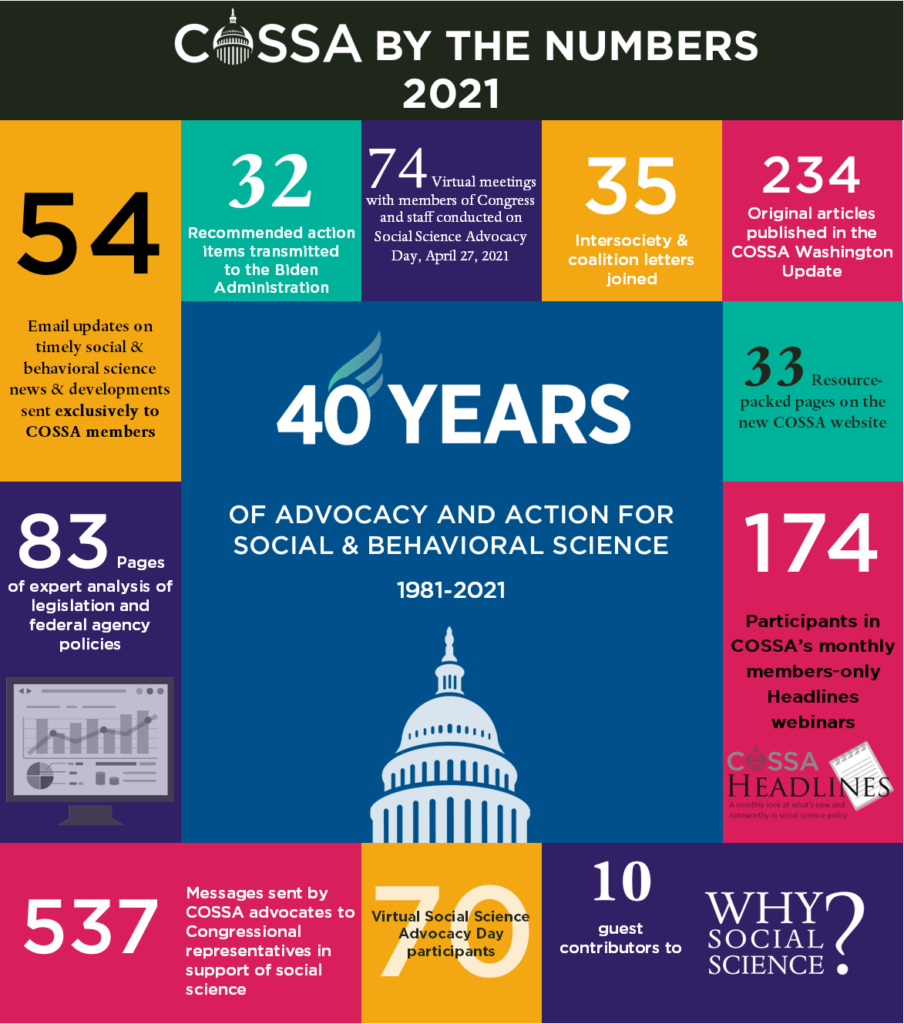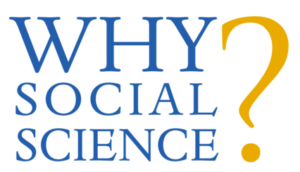Issue 1 (January 11)
OSTP Releases Guidance for NSPM-33, Long Awaited Research Security Roadmap
On January 4, the White House Office of Science and Technology Policy (OSTP) announced the publication of the implementation guidance for National Security Presidential Memorandum (NSPM)-33, the guidelines released in early 2021 intended to improve research security efforts at federal agencies (see previous COSSA coverage for more details). This long-awaited guidance, which was released as a report by OSTP’s National Science and Technology Council (NSTC) Joint Committee on the Research Environment (JCORE), aims to clarify requirements for federally funded researchers and set best practices at federal agencies to strengthen research security. The guidance offers direction on five major areas of research security addressed by NSPM-33: disclosure requirements and standardization, digital persistent identifiers, consequences for disclosure requirement violations, information sharing, and research security programs at federally funded research institutions.
Disclosure Requirements and Standardization – The guidance requires standardization of disclosure requirements and required forms for researchers seeking federal funding (including who is required to disclose personal information, financial information, and other relevant information) and clarifies requirements regarding the disclosure of potential conflicts of interest and participation in any foreign programs. The guidance also encourages the correction of any errors, incompletions, or changes to previously submitted forms and applications to improve trust between researchers and institutions.
Digital Persistent Identifiers – The guidance offers recommendations for federal agencies to standardize the use of digital persistent identifiers (DPIs), or a standard digital identification to easily share personal information, to simplify the disclosure process for researchers seeking federal funding. While the guidance stops short of requiring the use of DPIs, it does require agencies to provide the option of using DPIs at no cost to the researcher and make sure the DPIs are interoperable between agencies.
Consequences for Violation of Disclosure Requirements – Several potential consequences for disclosure violations by researchers are mentioned in the guidance depending on the severity of the violation, including criminal and civil charges, the rejection of research awards, the ineligibility of future awards, and other administrative sanctions. The guidance does, however, state the intent of the offending researcher as being a principal factor in assigning consequences, and further reiterates that researchers should be encouraged to correct past errors in disclosure forms without fear of undue consequences.
Information Sharing – The guidance implores federal agencies to be proactive about sharing information amongst the federal government about individuals who have violated disclosure requirements or those that are suspected to be violating requirements. It also encourages agencies to share research security information publicly and with research institutions that frequently seek federal funding.
Research Security Programs – NSPM-33’s requirements for research organizations receiving $50 million in federal research funding or more have been clarified. These organizations are required to certify that they have implemented a research security program including four different elements: cybersecurity, foreign travel security, research security training, and export control training (if appropriate).
International Collaboration – In addition to the five major areas addressed by the guidance, OSTP’s announcement accompanying the guidance emphasizes that research security must be undertaken with a thoughtful approach with regards to the culture of international collaborations in research, with OSTP Director Eric Lander writing, “if policies to address [research security] significantly diminish our superpower of attracting global scientific talent – or if they fuel xenophobia against Asian Americans – we will have done more damage to ourselves than any competitor or adversary could.” The guidance also authorizes a requirement for federal agencies to implement NSPM-33 in a nondiscriminatory manner, including among members of ethnic or racial minority groups.
Among the next steps listed in the guidance are the development of model disclosure forms and instructions within the next 120 days to be as clear as possible about what is expected of researchers seeking federal funding. It also mentions JCORE will continue to develop standards for use by Federal agencies and research organizations to certify research security programs. The full implementation guidance and announcement are available on the OSTP website.
2021 By the Numbers

As we close the books on COSSA’s 40th year, we are continually reminded of the perseverance of the social and behavioral science community and the contributions our sciences make to real issues of the day. There has arguably never been a more important time for the social and behavioral sciences to inform and guide the work of our nation’s leaders.
As the voice for social and behavioral science research in our nation’s capital, COSSA serves as a conduit between the research community and lawmakers on Capitol Hill and in Executive Branch agencies. We could not do our work without the support, encouragement, and guidance of our members. The challenges of the last couple years serve as reminder that we all do better when we work together. We have a lot of work to do this year—and it would not be possible without you!
“Why Social Science” Can Help Us Learn Self-Compassion

This week’s Why Social Science? post comes from XXXX.
The latest Why Social Science? guest post comes from social psychologist Yuki Miyagawa of Otemon Gakuin University in Osaka, who writes about his research on learning self-compassion, which can help us become more resilient individuals.
Congress Starts 2022 with Packed To-Do List
The 117th Congress returned to work this month for its second session still struggling to resolve legislative issues meant for last year. As previously reported, while fiscal year (FY) 2022 began on October 1, 2021, Congress enacted a continuing resolution (CR) late last year punting the annual appropriations deadline to February 18. That means, more than three months into the new fiscal year, federal agencies are operating at FY 2021 levels with no certainty of when they will receive their FY 2022 funding or what that funding will look like for this year.
Among the reasons for the delay last year was to allow Congress time to focus on passing the Build Back Better Act (H.R. 5376), President Biden’s multi-trillion-dollar reconciliation package containing funding for social safety net programs and climate change initiatives, as well as some funding for federal research agencies. However, negotiations fell apart just before Christmas when West Virginia Senator Joe Machin (D) announced he would not support the measure, halting all forward movement on the bill for the foreseeable future.
As Congress returns to work, pressure has intensified to complete the annual appropriations bills. While the reconciliation package remains the top priority for Democrats, other lawmakers are urging leadership to pivot to the FY 2022 appropriations bills.
Complicating things further, sources are reporting the White House expects that its FY 2023 budget request, which is required to be sent to Congress in early February, will be delayed by at least a month, likely a result of the delays in the FY 2022 process and reconciliation standoff.
We will know more as we get closer to the CR deadline of February 18. In the meantime, you can follow COSSA’s coverage of FY 2022 appropriations and the reconciliation package here.
Longtime Science Champion Eddie Bernice Johnson Enters Final Year in Congress
Late last year, House Science Committee Chair Eddie Bernice Johnson (D-TX) announced that she would retire from Congress at the end of her term. Johnson, who receive the COSSA Distinguished Service Award in 2016, has been one of the social science enterprise’s fiercest champions throughout her tenure on the Science Committee. She defended social and behavioral science grants from unwarranted attacks and championed legislation to advance the nation’s scientific enterprise as a whole. It is unclear who will succeed Johnson as the top Democrat on the Science Committee in the next Congress. Rep. Zoe Lofgren (D-CA) has seniority, but shakeups in committee membership are likely, particularly if the Democrats fail to maintain control of the House.
NSF Announces Topics for 2022 Convergence Accelerator, Agency Seeking Feedback on Future Topics
On January 4, the National Science Foundation (NSF) announced the topics for the Convergence Accelerator for fiscal year (FY) 2022, applications for which are expected to open in the coming months. NSF’s Convergence Accelerator aims to promote research in areas of strategic and societal importance through a three-tiered process: ideation, and two convergence research phases. The tracks for FY 2022 are:
- Enhancing Opportunities for Persons with Disabilities
- Sustainable Materials for Global Challenges
- Food & Nutrition Security
In addition, NSF has announced it is seeking community feedback for future Convergence Accelerator topics. On December 13, 2021, NSF released a Dear Colleague Letter seeking input from science community stakeholders on potential topics for the next round of funding for NSF’s Convergence Accelerator expected in FY 2023. Community input will be accepted through February 28, 2022. More information is available on the NSF website.
NSF Announces Partnership with WT Grant Foundation on Enhancing the Impact of Research about Youth
In December, the Directorate for Social, Behavioral, and Economic Sciences (SBE) within the National Science Foundation (NSF) issued a Dear Colleague Letter announcing a partnership with the William T. Grant Foundation to solicit research proposals on “Increasing the Use, Usefulness and Impact of Research about Youth.” Research topics may cover improving decision-makers’ use of research, making research more useful in policy creation and practice, and identifying when and how using research findings improves youth outcomes. Proposals may be submitted to either NSF or the WT Grant Foundation. More information is available in the Dear Colleague Letter.
Additional research opportunities supported by the WT Grant Foundation were discussed during the November 2021 COSSA Headlines webinar. You can watch the recording here.

